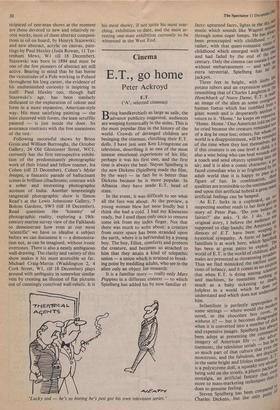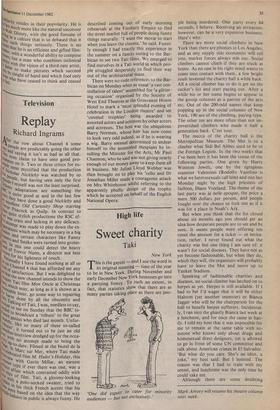Cinema
E.T., go home
Peter Ackroyd
E.T.
('A', selected cinemas) D ring handkerchiefs as large as sails, the 1/advance publicity suggested, audiences are weeping hysterically in the aisles. This is the most popular film in the history of the world. Crowds of deranged children are besieging the cinemas, clutching their E.T. dolls. I have just seen Ken Livingstone on television, describing it as one of the most intense emotional experiences of his life; perhaps it was his first one, and the first time is always the best. Ste,ven Spielberg is the new Dickens (Spielberg made the film, by the way) — in fact he is better than Dickens because he is more popular. In Albania they have made E.T. head of state.
In the event, it was difficult to see what all the fuss was about. At the preview, a young woman blew her nose loudly but I think she had a cold. I had my Kleenexes ready, but I used them only once to remove some ink from my index finger. Not that there was much to write about: a creature from outer space has been stranded upon the earth, where it is befriended by a young boy. The boy, Elliot, comforts and protects the creature, and becomes so attached to him that they attain a kind of telepathic union — a union which is strained to break- ing point by meddling adults, who see in the alien only an object for research.
It is a familiar story — really only Mary Poppins in a different context — to which Spielberg has added his by now familiar ef- fects: upturned faces, lights in the skY,,ped and music which sounds like Wagner stral.ys through some sugar lumps. He has algi"or been preoccupied with childhood „i rather, with that quasi-romantic vision '0, childhood which emerged with R011556190 and had faded by the end of rile „*0 century. Only the cinema can sustain it "the without embarrassment — and with the extra terrestrial, Spielberg has lilt jackpot. Three feet in height, with lint" potato tubers and an expression uncarit resembling that of Charles Laughton Hunchback of Notre Dame, E.T. is an image of the alien as some overgre"s human foetus which has tumbled fr0it/0 giant womb and is desperately anxinti,s„,• return to it. 'Home.' he keeps on repeaPli 'Home. Home.' One American told ru e th'!ie he cried because the creature reminded "title of a dog he once lost; others, for wit°. j world is a disappointment, will be ren11n4 of the time when they lost themselves. ;:is if this creature is on one level a child, ".th also a wise being who can heal wounds " a touch and send objects spinning ni to , air; and it is also a comic character, 3 P; faced comedian who is so frightened bYct adult world that it is happy to Pass h—est figure of fun. In combination ' , t,"id. qualities are irresistible to the sentiment ',:d and upon this artificial hybrid a great ttla- artificial feelings can be heaped. un' As E.T. lurks in a cupboard, all „he suspecting mother reads to her little girl story of Peter Pan. 'Do you belrethe fairies?' she asks. 'I do. I do.' Ill ,-05 au te original story, I believe the audience , supposed to clap hands; the Amer diences of E. T. have been weePtin ° hysterical sympathy. A form of bact. ;hog fantilism is at work here, which Spiewitie has been at great pains to exploit- do world of E.T. is the world of children; males are presented as threateni eu ng Thus we find mimicked the earliest srr5e tions of infancy, and it comes as no surPists that when E.T. is dying among seierit so and machines, he resembles nothinga much as a baby sickening to denot helpless in a world which he rines ci understand and which does not understan him. e Infantilism is perfectly aPPr°Priat .erti some settings — where would the trina be novel, or the chocolate box cover _bie , without it? — but it becomes disagreea..4 when it is converted into a number of st!`, and expensive images. Spielberg has alw_cl'ai been adept at presenting the contrilL[ver' imagery of American life — the he is tisements, the television serials — but the even so much part of that culture that e monstrous, and the fabulous, are dePl, in the same bright and lifeless manner. IrentlY is a polystyrene doll, a squeaky toY a t of being sold on the streets, a plastic Pnet`devies nostalgia, an artificial fantasy that,a0 it more to mass-marketing techniques t" does to genuine feeling.to Steven Spielberg has been coniPar""t of Charles Dickens, but the only Poin insitilfilarity resides in their popularity. He is to laAeft,ruoch more like the natural successor hvi all Disney, with the good fortune of 411,8 in a culture that is so debased that it del; such things seriously. There is no 4.ul that he is an efficient and gifted film-
With a wonderful ability to compose
but a man who combines technical th the vision of a third-rate artist, erii,,,Ule to make pictures which succeed tho'seeY sleight of hand and which fool only to feeiwl.10 have ceased to think and ceased











































 Previous page
Previous page